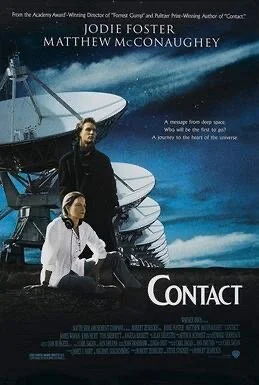Director: Robert Zemeckis
Cast: Jodie Foster, Matthew McConaughey, James Woods, John Hurt
Have I Seen it Before: Certainly. However, this particular screening came about after the recent news that the Arecibo Observatory in Puerto Rico is being decommissioned after suffering recent structural difficulties. Lora mentioned such news was doubly sad, as it was the location for the opening scenes of the film. I insisted that the film actually started with Jodie Foster discovering the Vega signal at the Very Large Array in New Mexico.
She was right; I was wrong. I apparently hadn’t remembered the film in much detail. It’s entirely possible that I have clearer memories of the trailer than I did of the film itself. And it wasn’t exactly like I saw it once in the theater and haven’t looked at it since. I’m pretty sure I’ve seen at least once in the last ten years. The human mind is weird.
Did I Like It: I’m happy to report that my lack of memory for the film had nothing to do with its quality. Far before Zemeckis decided to be content with being the least interesting filmmaker addicted to the WETA workshop, he was able to follow up the cultural permeation of Forrest Gump (1994) and the singular crowd-pleasing qualities of Back to the Future (1985) with the kind of meaty, thoughtful science fiction movie that best recommends the genre. Films that were common in an age of 2001: A Space Odyssey (1968) and Planet of the Apes (1968)* and are rare enough now, give or take an Arrival (2016) or two**.
McConaughey may be a member of that breed of movie stars who is almost entirely personality. That’s not necessarily a bad thing, especially here where Foster is allowed to give the far more nuanced and interesting performance. Had it been another actor portraying her love interest (or, for that matter, a less confident screen presence than Foster herself) Zemeckis and the studio might have been tempted to let the man overpower the woman in the frame.
How many science fiction films lead one to talk about the performances as the central feature?
*Between those two and the superlative second season of the original Star Trek, sci-fi may not have seen a better tonnage crossed with quality year than the year Apollo 8 finally moved the idea of landing on the moon from the purely theoretical to the imminently possible.
**You may want to bring up Interstellar (2014), but for my money Inception (2010) was far more thought-provoking.

